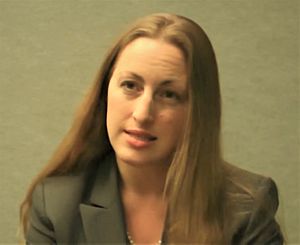Michelle Monje facts for kids
Quick facts for kids
Michelle Monje
|
|
|---|---|

Monje in 2015
|
|
| Born | 21 March 1978 |
| Alma mater | Vassar College Stanford University |
| Known for | Diffuse intrinsic pontine glioma |
| Spouse(s) | Karl Deisseroth |
| Scientific career | |
| Institutions | Stanford University |
| Doctoral advisor | Philip A. Beachy |
| Other academic advisors | Theo Palmer |
Michelle Leigh Monje-Deisseroth is a brilliant scientist who studies the brain and helps people with brain cancer. She works as a professor at Stanford University, where she teaches and does research. Dr. Monje is famous for her work on a very serious type of brain cancer called DIPG, especially in children. She tries to find new ways to treat it.
Contents
Early Life and Education
From a very young age, Michelle Monje knew she wanted to be a doctor. She grew up near San Francisco and loved learning about living things, like plants and animals, from when she was a kid. When she was younger, she was a figure skater. She even taught figure skating to kids with special needs.
She went to Vassar College for her first degree. Later, she studied medicine and earned two important degrees, an MD (Doctor of Medicine) and a PhD (Doctor of Philosophy), from Stanford University in 2004. She then trained at Harvard Medical School and worked at big hospitals like Brigham and Women's Hospital. She became an expert in brain cancer in 2013.
Research and Discoveries
Dr. Monje's research focuses on how the brain develops and changes. She studies how brain cells connect and work together for things like thinking and moving. She also looks at how the tiny environment around a tumor affects how cancer cells grow.
Understanding Brain Tumors
Since 2011, Dr. Monje has been working at Stanford University to find new treatments for brain cancer. She has spent a lot of time studying DIPG. This is a very tough cancer because it grows in the brainstem, which controls many important body functions. It's hard to treat with medicine and impossible to remove with surgery.
In 2009, Dr. Monje and her team made a big breakthrough. They were the first to grow DIPG cells in the lab from donations. This allowed them to watch how the cells grew and test different medicines to see what might work. Her lab shares these important tumor samples with other scientists around the world. She also uses mouse models to test new treatments before they are tried in people.
Developing New Treatments
Dr. Monje is leading a special study called a Phase 1 clinical trial. This trial is testing a medicine called panobinostat. This drug has shown promise in slowing down DIPG growth and helping mice live longer.
She has also worked on creating special immune cells, called CAR-T cells, to fight brain tumors. Her team looked for specific molecules on the surface of DIPG tumors that these CAR-T cells could target. They found a molecule called GD2 on about 80% of DIPG tumors.
A change in the tumor's DNA, called the H3K27M mutation, causes too much GD2 to appear and helps the tumor grow. Another scientist, Crystal Mackall, helped develop CAR-T cells that attack this GD2. These special cells have been shown to kill DIPG cells in lab tests. Dr. Monje's engineered cells can even cross the blood–brain barrier, which is a protective shield around the brain. This means they can reach the cancer cells and greatly reduce their number in mice.
Recognition and Advocacy
In 2018, Dr. Monje became certified in Neurology by the American Board of Psychiatry and Neurology. In 2019, she received a special award from State senator Jerry Hill.
Thanks to Dr. Monje's research and efforts, the United States now recognizes May 17 as Paediatric Brain Cancer Awareness Day. Her important research is supported by families of children who have been affected by DIPG. She also helps guide a non-profit group called Abbie's Army, which works to find a cure for DIPG.
She received the 2019 Presidential Early Career Award for Scientists and Engineers, which is a very high honor for young scientists.
Awards and Honors
- 2023 Richard Lounsbery Award
- 2021 MacArthur Fellowship
- 2021 Member, National Academy of Medicine
- 2019 Presidential Early Career Award for Scientists and Engineers
- 2017 Neuro-Oncology Investigator Award, American Academy of Neurology
Personal Life
Dr. Monje is married to fellow neuroscientist Karl Deisseroth. They have four children together.

